|
|
|
Sort Order |
|
|
|
Items / Page
|
|
|
|
|
|
|
| Srl | Item |
| 1 |
ID:
119100
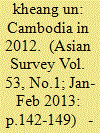

|
|
|
|
|
| Publication |
2013.
|
| Summary/Abstract |
Cambodia in 2012 mourned the death of its revered former King Norodom Sihanouk. The government was criticized for land conflicts and the deterioration of political liberties. Otherwise, the country enjoyed strong economic growth and basked in the international spotlight as Association of Southeast Asian Nations chair. Hun Sen's Cambodian People's Party further consolidated its power, sidelining opposition parties and coopting disgruntled workers and farmers.
|
|
|
|
|
|
|
|
|
|
|
|
|
|
|
|
| 2 |
ID:
128529


|
|
|
|
|
| Publication |
2013.
|
| Summary/Abstract |
Although the pluralist system of land tenure in Vanuatu does not directly discriminate against women, the operation of the system and contemporary interpretations of custom is increasingly marginalising women from the decision making processes regarding land management and control. Commitment to the principles of gender equality through constitutional guarantees and the ratification of relevant international treaty obligations, while providing a relevant legal framework for equality, have only had limited success in addressing discriminatory practices. This article analyses alternative ways to overcome the barriers faced by women that are currently under consideration in many Pacific island Countries, including recording and registration, as well as legal vehicles such as incorporating customary land groups, trusts and community companies. This article concludes that while both existing and proposed mechanisms have the potential to secure for women a greater role in decision making processes regarding land management and control, that potential will not be realised in the absence of knowledge, empowerment and the acceptance of the legitimacy of such rights
|
|
|
|
|
|
|
|
|
|
|
|
|
|
|
|
| 3 |
ID:
144258
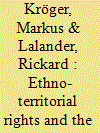

|
|
|
|
|
| Summary/Abstract |
In recent times a growing number of Latin American rural groups have achieved extended ethno-territorial rights, and large territories have been protected by progressive constitutions. These were the outcomes of extended cycles of national and transnational contentious politics and of social movement struggle, including collective South–South cooperation. However, the continent has simultaneously experienced a resource extraction boom. Frequently the extractivism takes place in protected areas and/or Indigenous territories. Consequently economic interests collide with the protection and recognition of constitutional rights. Through a review of selected demonstrative cases across Latin America, this article analyses the (de jure) rights on paper versus the (de facto) rights in practice.
|
|
|
|
|
|
|
|
|
|
|
|
|
|
|
|
| 4 |
ID:
147427


|
|
|
|
|
| Summary/Abstract |
Land disputes have been an important risk to social stability in China since the turn of the century. This paper uses provincial data on illegal land uses during the period 1999–2010 as a proxy for the intensity of land conflicts to investigate the effects of foreign direct investment (FDI) and fiscal decentralization on jurisdictional land conflicts. The results show that the FDI growth rate has a positive and significant impact on the growth rate of illegal land use when there is a high degree of fiscal decentralization. We thus provide evidence supporting the hypothesis that regional competition for FDI, as shaped by fiscal decentralization, tends to raise conflicts over land in China.
|
|
|
|
|
|
|
|
|
|
|
|
|
|
|
|
| 5 |
ID:
128525


|
|
|
|
|
| Publication |
2013.
|
| Summary/Abstract |
Much of the urban growth in developing countries is taking place along infrastructure corridors that connect cities. The villages along these corridors are frenzied and contested sites for the consolidation and conversion of agricultural lands for urban uses. The scale of changes along these corridors is larger than the political jurisdiction of local governments, and new regional institutions are emerging to manage land consolidations at this corridor scale. This article compares two inter-urban highways in India and the issue image_86_4_Hwy Urbanization - Balakrishnanhybrid regional institutions that manage them: the Bangalore- Mysore corridor, regulated by parastatals, and the Pune-Nashik corridor, by cooperatives. It traces the emergence of parastatals and cooperatives to the turn of the twentieth century, the ways in which these old institutions are being reworked to respond to the contemporary challenges of highway urbanization, and the winners and losers under these new institutional arrangements. I use the term "negotiated decentralization" to more accurately capture the back-and-forth negotiations between local, regional and state-level actors that leads to context-specific regional institutions like the parastatals and cooperatives
|
|
|
|
|
|
|
|
|
|
|
|
|
|
|
|
| 6 |
ID:
129197


|
|
|
|
|
| Publication |
2014.
|
| Summary/Abstract |
On November 10th, 2013, the Israeli cabinet voted in a special session to authorize the demolition and removal of Umm al-Hiran, an "unauthorized," Palestinian Bedouin village in the Negev Desert, and to build in its place a new community for national Jews to be named Hiran, which had been planned and approved in early 2002. The stated reason for this demolition and forceful eviction is the lack of permits for the existing settlement, with Umm al-Hiran being one of a number of Palestinian Bedouin communities that were settled without permits and are currently subject to intense Israeli plans for removal. Umm al-Hiran itself was set-up in early 1956 by the Palestinian Abu-Alkian tribe after they had been forced to move from their ancestral tribal lands near Kibbutz Shoval in the Northern Negev.
A more critical development related to this event is the Israeli Parliament's passing of the first reading of the Prawer law. If the plan wins final approval, as it appears it will, it would cause the forceful displacement of 40,000-70,000 Arab Bedouins from the Negev, the confiscation of 800,000 dunams of Arab land, the razing to the ground of 36 or more Arab villages, and the dispossession of another generation of Palestinians. According to Adallah, the Legal Center for Arab Minority Rights in Israel, the "underlying premise of the draft bill is that there is no Bedouin land ownership," effectively negating the "population's right to property and historic affinity to the land." At the heart of this matter is the ongoing contestation of Palestinian land rights, with the Israeli government using its authority to define these policies to favor the Jewish population over the Arab. Thus, this bill, like others before it, "promotes the principle of segregation along the lines of ethnic affiliation and labeling."
|
|
|
|
|
|
|
|
|
|
|
|
|
|
|
|
| 7 |
ID:
155005
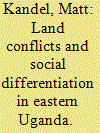

|
|
|
|
|
| Summary/Abstract |
Rising competition and conflict over land in rural sub-Saharan Africa continues to attract the attention of researchers. Recent work has especially focused on land governance, post-conflict restructuring of tenure relations, and large-scale land acquisitions. A less researched topic as of late, though one deserving of greater consideration, pertains to how social differentiation on the local-level shapes relations to land, and how these processes are rooted in specific historical developments. Drawing on fieldwork conducted in Teso sub-region of eastern Uganda, this paper analyses three specific land conflicts and situates them within a broad historical trajectory. I show how each dispute illuminates changes in class relations in Teso since the early 1990s. I argue that this current period of socioeconomic transformation, which includes the formation of a more clearly defined sub-regional middle class and elite, constitutes the most prominent period of social differentiation in Teso since the early 20th century.
|
|
|
|
|
|
|
|
|
|
|
|
|
|
|
|
| 8 |
ID:
128535
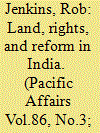

|
|
|
|
|
| Publication |
2013.
|
| Summary/Abstract |
India's legal regime governing the compulsory acquisition of private land by the state for "public purposes" - centered on the Land Acquisition Act 1894 (LAA) - has long been criticized for breeding corruption and insufficiently protecting landowners and local communities. Attempts to overhaul the LAA have faced stiff resistance from powerful interests within and outside the state. When the United Progressive Alliance government took power in 2004, few would have guessed that it would seek to replace the LAA with legislation that imposes more rigorous standards for the compulsory acquisition of land and detailed rules for rehabilitating displaced people. Yet, in 2011 the government introduced the Land Acquisition, Rehabilitation and Resettlement Bill (LARRB). This article argues (1) that the LARRB displays certain distinctive characteristics shared by other rights-related statutes enacted under the UPA government; (2) that the emergence of this distinctive - and unforeseen - piece of legislation was driven largely by India's approach to creating Special Economic Zones; and (3) that both the LARRB's content and the process by which it was introduced have implications for debates of wider theoretical significance, including the increasingly hybrid nature of rights, and the desirability of combining insights from the literatures on "policy feedback" and "policy entrepreneurs."
|
|
|
|
|
|
|
|
|
|
|
|
|
|
|
|
| 9 |
ID:
129823


|
|
|
|
|
| Publication |
2014.
|
| Summary/Abstract |
When seriously discussing the fate of the ongoing, everlasting Palestinian-Israeli negotiation, which attempt to reach a peace agreement after decades of conflicts between two people over one historical territory, which I usually refer to as historic Palestine, but which others on the Israeli side may choose to call historic Eretz Israel, analysts are usually face with the dilemma alluded to in the title of this article.
|
|
|
|
|
|
|
|
|
|
|
|
|
|
|
|
| 10 |
ID:
128259
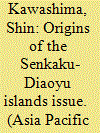

|
|
|
|
|
| Publication |
2013.
|
| Summary/Abstract |
Although news accounts cover the Senkaku/Diaoyu Islands issue, rarely is historical background given. This article focuses on Taiwanese diplomatic documents dating from after World War Two through the early 1970s, the period before Japan-China diplomatic relations were normalized, to try to clarify the timeline of when the Senkaku/Diaoyu Islands became a diplomatic issue.
|
|
|
|
|
|
|
|
|
|
|
|
|
|
|
|
| 11 |
ID:
125303
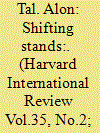

|
|
|
|
|
| Publication |
2013.
|
| Summary/Abstract |
While the Middle East is frequently in the news because of political volatility and violence, there is an underlying lack of environmental equilibrium that poses a comparable threat to regional stability. Israel's neighbors--Egypt, Jordan, and Palestine--are arid countries with limited natural carrying capacity and burgeoning populations. Providing food and employment in what were traditionally agrarian economies has contributed to significant depletion of soil and water resources. Israel's experience as an innovator in technologically intensive dryland agriculture and forestry is entirely different. Yet it is not clear whether the grand Israeli experiment in water management and combating of desertification offers a compelling alternative model to its neighbors should diplomatic breakthroughs pave the way for transboundary cooperation. Not only are the socioeconomic and cultural circumstances entirely different, but the sustainability of some of Israel's unique management practices remains questionable.
|
|
|
|
|
|
|
|
|
|
|
|
|
|
|
|
| 12 |
ID:
128526


|
|
|
|
|
| Publication |
2013.
|
| Summary/Abstract |
Since 2000 in New Delhi, urban decentralization has mainly come in the form of the highly visible Bhagidari or partnership scheme, inviting city residents to participate in a "process of dialogue and the discovery of joint-solutions." This paper critically examines this program between 2000 and 2012, through the experiences of primarily middle-class neighbourhood organizations (called Resident Welfare Associations, or RWAs) that were included in the scheme. The paper argues that rather than constitutional decentralization, Bhagidari as an initiative must be read in terms of a larger shift to entrepreneurial governance. Bhagidari's success has been in delegating management to voluntary middle-class neighbourhood associations called RWAs, at little cost to city government, while seemingly opening up a "participatory" space for middle-class urban issue image_86_4_Decentralized Delhi_Mehraresidents in civic affairs. However, the article argues that Bhagidari's impact has come to represent an attempt at harnessing and managing the new middle-class aspiration to engage with urban government for administrative and political ends. In this context, Bhagidari has also been seen as an important means of cultivating middle-class consent and a constituency through courting RWAs for an ambitious chief executive. Over time, this has become a common strategy for building political and civic visibility for a range of actors, and thus the number of RWAs has proliferated
|
|
|
|
|
|
|
|
|
|
|
|
|
|
|
|
|
|
|
|
|